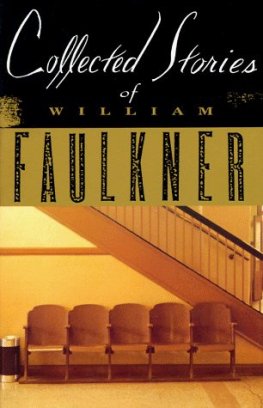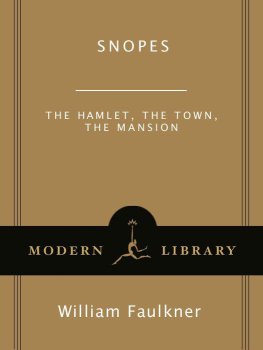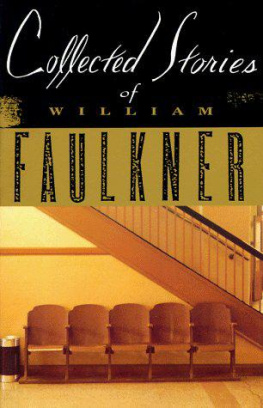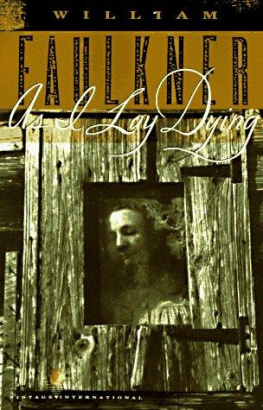ACROSS THE CREEK
ACROSS
THE CREEK
Faulkner Family Stories
Jim Faulkner

Copyright 1986 by the University Press of Mississippi
All rights reserved
Manufactured in the United States of America
Print-on-Demand Edition
Library of Congress Cataloging-in Publication Data
Faulkner, Jim, 1923
Across the creek.
I. Faulkner, William, 18971962BiographyFamily.
2. Faulkner, John 19011963. 3. Faulkner family.
4. Novelists, American20th centuryBiography.
5. Oxford (Miss.)Biography. 6. Oxford (Miss.)
Social life and customs. 7. Oxford (Miss.)Fiction.
I. Title.
PS3511.A86Z7828 1986 813.52 [B] 865629
ISBN 0878053026
TO THE MEMORY OF
my wife Nan,
my father and mother
John and Dolly,
and my uncle William,
WHOSE SPIRITS FLOW
THROUGH THESE PAGES
Contents
Foreword
Floyd C. Watkins
Foreword
A writer of personality, family, and character who spends most of his years and days in his community comes to know the people, and they come to know the stories about the writer almost as well as he knows his place. William Faulkner and Oxford, Lafayette County, Mississippi, knew each other well. The county and Faulkners fictional county, Yoknapatawpha, are not the same place, but the similarities are so great that the distinctions have never become precisely clear, and they never will.
Faulkner and his books have been discussed critically and biographically about as much as any other twentieth-century author. But it is difficult for the outside reader to understand the daily Faulkner in his hometown. A few literary people lived in Oxford, but Faulkner went out of his way as much to avoid them as he did to mingle with them. Much of his time he spent with plain people of diverse interests and a wide range of social class and wealth, but most of them were not the kind of people to become a significant part of the daily news or of history.
Many there be who have tried to describe William Faulkner, the citizen of Oxford: a number of fellow citizens of various times during Faulkners life in Oxford have written a collection of memories; a fellow hunter has written about Faulkner with his hunting companions and about the people who were part of the background in the stories; his two brothers who survived him have published books about him and his family; and a number of short and fugitive pieces have appeared in one form and another.
William Faulkner, the daily man of Oxford, nevertheless, is still in many details unknown to those who write about him. It is a deplorable gap in knowledge, because Faulkner was a small-town southern citizen as well as a writer of fiction, a member of small literary groups, a writer of motion picture scripts, a winner of the Nobel Prize, and a world celebrity.
Now one of Faulkners nephews adds to the common lore about him and his community. Jimmy Faulkner is a son of Williams brother John, himself the author of seven books, notably Men Working (about the WPA), Dollar Cotton, and My Brother Bill. Jimmy Faulkner played with a group of children who were encouraged and supervised in their youthful Faulknerian venturesomeness by John Faulkner and William Faulkner and others in the family. Jimmy Faulkner and his Uncle William (Brother Will, Jimmy calls him) have sat together in silence, talked a little, hunted together, and lived together in a small town. Jimmy was the last Faulkner to see the great author alive. Jimmy knows the characters and the lives of the Faulkner men, their families, and their old retainers better than any Faulkner alive knows them. These stories, therefore, are appropriate and significant tales about the place and time of the leading writer of Oxford.
Jimmy knows many of the people and the episodes that William and John knew, but he tells different things about them, often in different ways. He knows the aristocrats of the county, the hunters, the farmers, the neighbors and friends, and some others. The humor, the tall tales, the adventures and misadventures of his stories have a background similar to Faulkners owneven when there may be little close resemblance between these stories and the characters created by the brothers John and William Faulkner. Jimmy Faulkners stories are old-fashioned in their own way. They are typical and excellent folklore, humor, history, fictionalized history, and accounts of southern life. They do, as the scholar says, shed new light on the Faulkners in episodes not known before, but they would be fun in themselves even if they did not provide new historical and literary information about the Faulkner people and country at all.
FLOYD C. WATKINS
Preface
All resemblances in this book to the places and people of Oxford, Lafayette County, Mississippi, during my childhood are entirely intentional. With a little less than the usual embroidery of southern storytellers, these recollections are as true as I could make them.
I think I should mention, however, that two of the piecesI have placed them last in the collectionare not actually recollections but rather stories in which fact sits side by side with fiction. Grandfather in the first of these, Aunt Tee and Her Two Monuments, is John Wesley Thompson Falkner, my great-grandfather. But he died the year before I was born and therefore could not have told me the story of the two Confederate monuments as I have him doing. Readers who are familiar with the Falkner-Faulkner genealogy will no doubt discover that Grandfather in the second of these stories, Grandfather Crossing the Creek, combines elements of both John Wesley Thompson Falkner and his father, Colonel William C. Falkner, my great-great-grandfather. The son is of course the Falkner who lived in town in the big white house on South Street that he had built so he could be close to his bank and his law office. It was the father who fought in the war. The Old Colonel was shot to deathmortally woundedon the town square of Ripley, Mississippi, in 1889 by a former business partner. He was in his sixties then. The character in my story lives into his nineties and simply dies at home in bed.
The stories in this book were written over a period of several years, and some of them originally appeared in the Southern Review, Delta Review, Mississippi Review, and Delta Heritage, though in a somewhat different form. I would like to acknowledge publication by those magazines. I thank Jo Marshall of Jefferson State Junior College, Birmingham, for convincing me that I needed to record these stories and for working with me as I did so. I would especially like to express my deep appreciation to Floyd C. Watkins of Emory University, whose untiring efforts and encouragement caused this collection to happen.
JIM FAULKNER
ACROSS THE CREEK
Roasting Black Buster
PRESIDENT ROOSEVELT was well into his second term in the White House, and the country was creeping out of the Big Depression, not as fast as some of our leaders would like us to believe, but it was. There were WPA projects and other government programs that gave people jobs, and youd see tenant farmers riding to town in homemade buses and then riding back that afternoon after quitting time, back to their little hillside farms. The CCC camps around the North Mississippi hills were giving boys and men barracks homes like they would know later when they were mobilized in the army during World War II, and mess halls too, like the army, and fifteen dollars in exchange for a months work planting seedling pine trees to stop the erosion on the worn-out farms that they had helped to cause by laziness and neglect. It was more money than any of them had ever seen at one time in their lives except maybe in a crap game or at a moonshine still.
Next page








